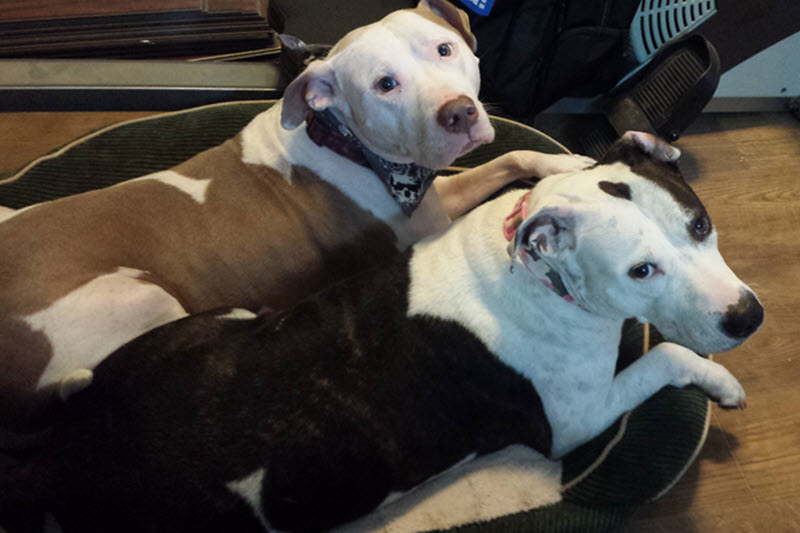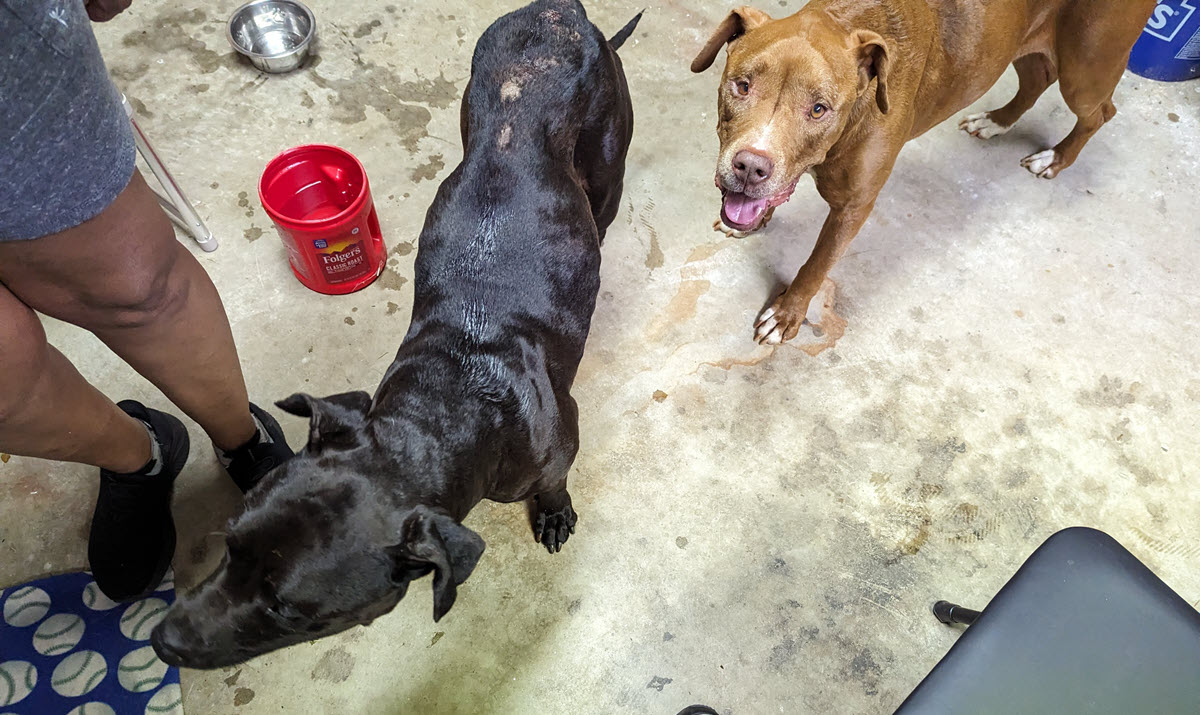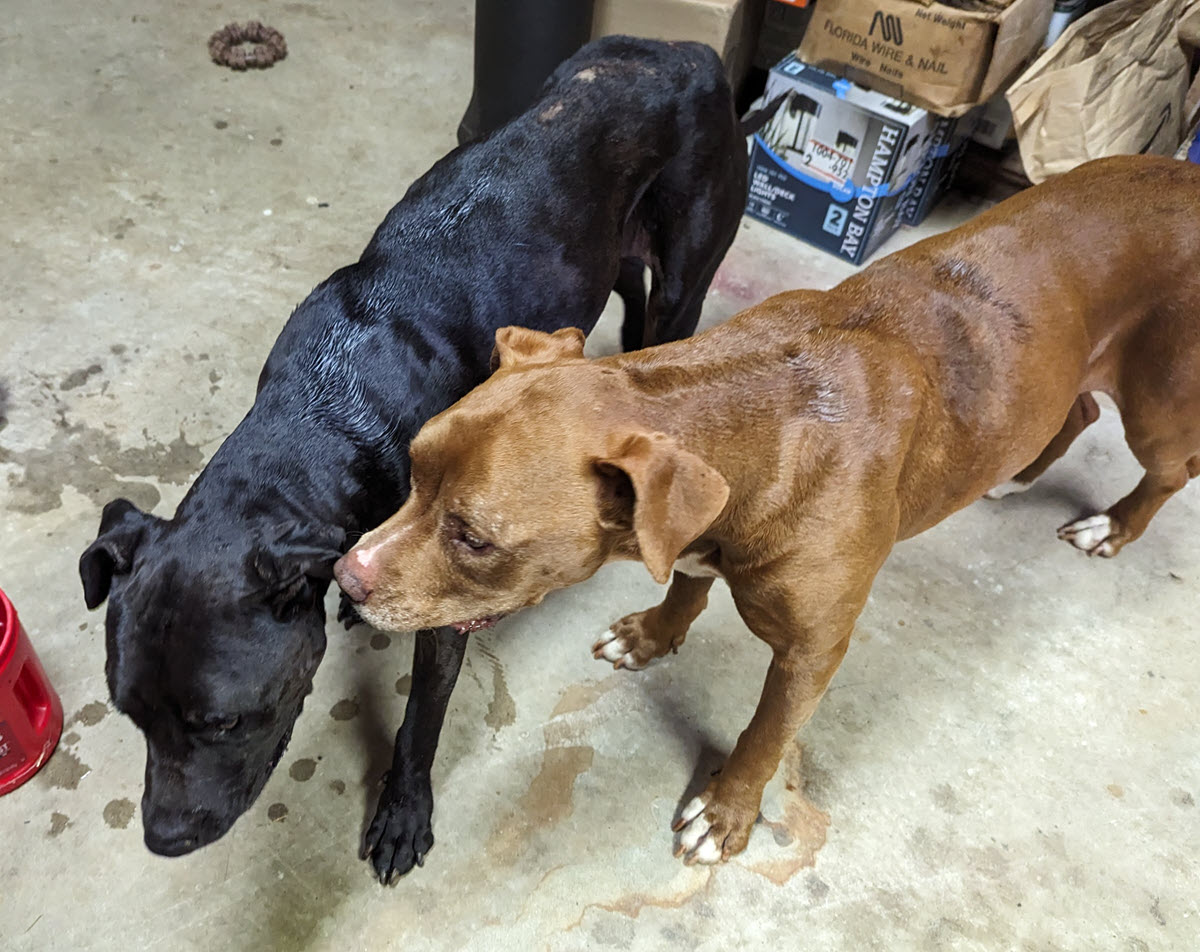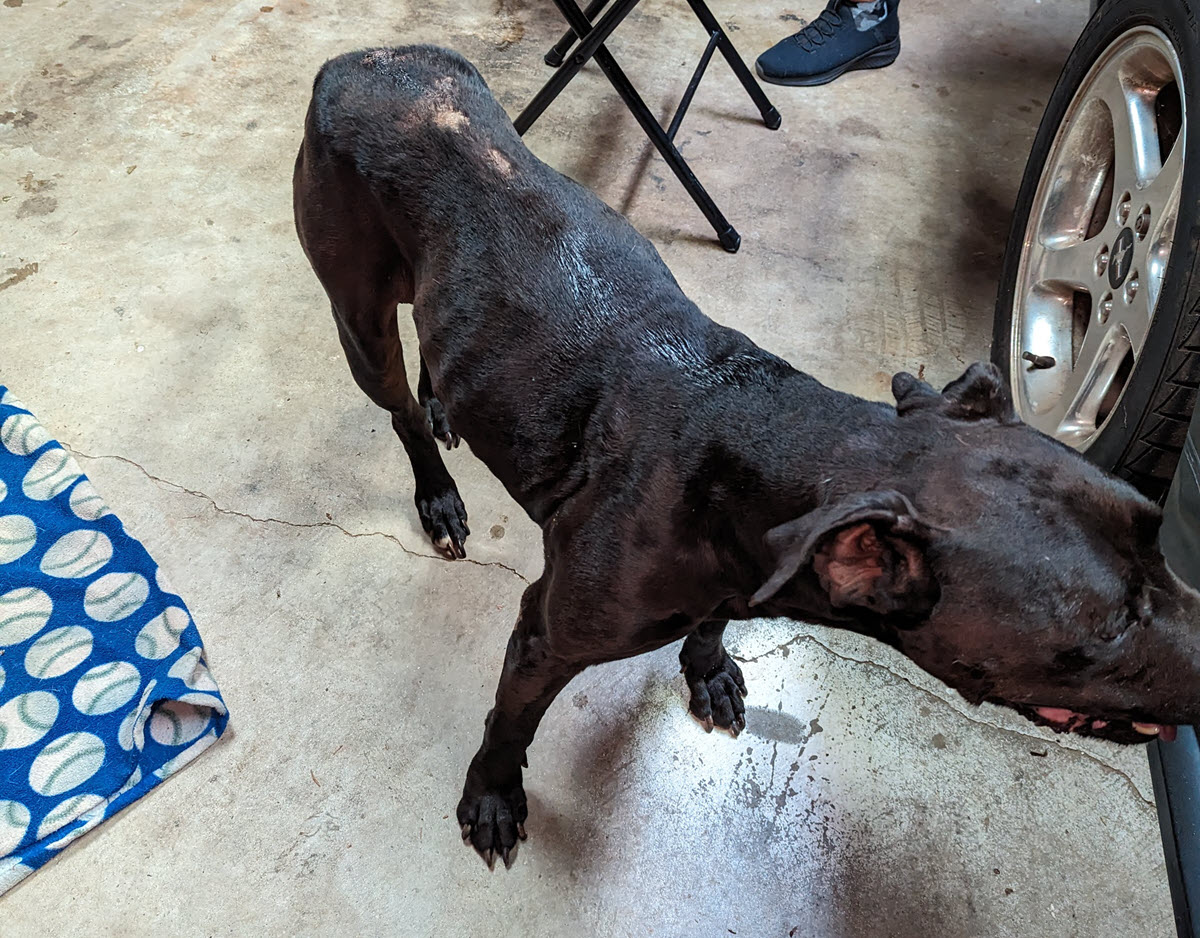In the past 20 years, we’ve faced down and debunked a lot of rescue dog myths, and we want to set the record straight on a few misconceptions about these lovable little goofballs.
Our rescues bring unending joy and humor into our lives and, as life unfolds, more grief than I care to admit as we eventually have to let them go.
But we, and they, are better for it. I have zero doubt.
So if you are on the fence about rescue dogs, please read on - the following comes from 20+ years of picking up strays and bringing them home.
Key Takeaways
- Debunking rescue dog myths can encourage adoption and save lives
- Accurate information about rescue dogs is essential for forming lasting bonds
- Understanding rescue dogs’ backgrounds helps adopters make informed decisions
Our most recent rescues - Amber and Pepper
This came up recently, this past Father’s Day, as my wife and I were returning from our favorite BBQ place. We were driving on a four-lane divided road, and traffic was stopped in both directions.
We were about four or five cars back from the front, and we could see little legs walking in the headlights back and forth across the road. A couple of stray dogs.
People being in a hurry, or just not caring, were honking and yelling at them and driving around them. Nobody stopped.
Except for us, of course.
This goes a long way to explaining why we have a house full of dogs.
My wife was driving, so I jumped out alongside the road and ran up to where the dogs were. Turns out it was two emaciated Pitbulls. I kneeled down on the side of the road and called them, and without any hesitation at all, they both bolted over to me and cuddled around my legs. They were terrified.
I sat down with them in the wet grass alongside that busy road until my wife could swing the truck around. It took about five or six minutes, I guess, but in that time, I bonded with those two in a way that is still incredibly strong today.
We loaded them into the back of the truck and took them home.
They had been on the road for a while; one had bad scabs on her back. Both had fleas. Both were super skinny.
I’m not sure how long they had been out on their own, but I would hazard a guess that they could not have lasted much longer.
Here they are the night we brought them home (they stayed in the garage for a few days until the flea situation cleared up):
Amber and Pepper - rescue dogs on the first night
They cleaned up nicely, though. After the flea treatment and a month or so of good food, exercise, and playtime with the rest of our pack, they are now full-fledged members of the JollyMutt goofball dogo society:
- Pepper and Dexter hanging on the deck
- New rescues with one of our older ones
- Pepper and Amber, looking happy and debunking all rescue dog myths!
- There are three rescue dogs in this pic, can you find them?
- Amber stole somebody’s bed!
- Amber chillin’…
- Here’s why we rescue…
- Amber somehow did this to herself
- Almost unrecognizable from the first day we got her. Beautiful pup
These two have integrated nicely into our pack and added to the joy we feel daily hanging out with them.
They are wonderful dogs and have made a wonderful addition to our pack. I already can’t imagine life without them in our house.
If we had been misguided by the popular myths around rescues, we may have driven past them as well. I’m so glad we didn’t.
Rescue dogs often have a negative reputation due to various myths and misconceptions surrounding them. These baseless notions sometimes discourage potential adopters from providing a loving home to these deserving animals.
Adopting a rescue dog can be a life-changing experience for both humans and dogs. It is crucial to separate fact from fiction and debunk these myths that prevent loving connections from forming.
When considering adoption, it’s crucial to accurately understand rescue dogs and the reality of their backgrounds and behavior.
By dispelling the false information about these animals, you can make more informed decisions and create lasting bonds with their new furry companions. With so many rescue dogs waiting for forever homes, shedding light on these common misconceptions can save countless lives and bring joy to families.
Understanding Rescue Dogs
What is a Rescue Dog?
A rescue dog is a dog that has been placed in a new home after being abandoned, neglected, or abused by its previous owner.
These dogs are taken in by rescue organizations or shelters, receiving care and attention until they find a loving and suitable forever home.
Rescue Dogs - Lost Dogs and Stray Dogs
Rescue dogs can come from various situations - some may have been lost or abandoned by their owners. In contrast, others may be stray dogs without a known history.
These dogs need care, love, and a new home in both cases. Shelters and rescue organizations often work together to provide a safe environment for these dogs and help them find homes where they can thrive.
Lost and stray dogs seem to be our specialty. To my knowledge, we have never actually gotten a dog from a shelter. We’ve always picked them up from the side of the road, or a field, or a swamp.
I know that my wife and I going to a shelter would be bad - we’d end up with dozens of new dogs.
Rescue Dogs vs. Shelter Dogs
The main difference between rescue dogs and shelter dogs is the organization that takes care of them.
Rescue groups typically focus on specific breeds or are breed-specific rescue groups, whereas shelters, often run by local authorities or non-profit organizations, care for a wide range of dog breeds and other animals.
Both rescue groups and shelters share the same goal of finding loving homes for the dogs in their care.
Rescue Dogs vs Purebred Dogs
One common myth is that rescue dogs are less quality than purebred dogs from breeders or pet stores.
This belief couldn’t be further from the truth. In fact, many rescue dogs are purebred dogs surrendered by their previous owners.
We have run Embark DNA tests on two of our dogs, and they were genuine, 100% “Pitbulls”; by that, I mean they were American Pit Bull Terriers. We rescued them together; they look alike and are best friends, so we always wondered if they were actually from the same pack or if, by chance, maybe a mother/son pair.
Turns out, DNA tests showed they were brother/sister.
Here they are:

By adopting a rescue dog, you can still find a specific breed while providing a loving home to a dog in need. Additionally, there’s no guarantee that a purebred dog from a breeder or pet store will be healthier or better behaved than a rescue dog.
With proper care and attention, rescue dogs can lead just as happy and fulfilling lives as their purebred counterparts.
Important Dates for Rescue Dogs
A few dates to keep in mind if you are involved with rescue dogs:
- National Rescue Dog Day (May 20th): Intended to bring awareness to all the wonderful dogs in shelters across the country who are still waiting for their forever home. Many shelters will hold special events on this day.
- Dogust 1st (August 1st): This is the celebrated birthday for all those rescue dogs who don’t have an official birthday! I love this idea. Also, August is the month of the dog, with many other dog-related days to remember:
- August 4th - Assistant Dog Day
- August 5th - Work Like a Dog Day
- August 10th - Spoil your Dog Day
- August 15th - National “Check the Chip” Day
- August 23rd - National Blind Dog Day
- August 26th - National Dog Day
Myths and Misconceptions
Myth: Rescue Dogs are Damaged Goods
It’s a common misconception that rescue dogs are damaged goods.
Many dogs end up in rescues due to circumstances beyond their control, such as their previous owner’s inability to care for them or a change in living situation.
Dogs become lost or strayed in many ways, perhaps just straying too far from the family car while Dad was pumping gas. Or jumping a fence during a storm. Nothing wrong with the dog; it just found itself in a bad situation.
These dogs are often loving and well-behaved, and even if they aren’t, don’t they at least deserve a chance?
Myth: All Rescue Dogs are Unhealthy
Another myth is that all rescue dogs are unhealthy and sick.
In reality, most don’t have any illnesses, and those usually have minor, easily treatable issues.
Rescue organizations work hard to ensure the dogs they care for receive proper medical treatment and are healthy before finding them forever homes.
Many of the dogs we find have fleas, and we’ve rescued a few with heartworm, which ends up being expensive to treat (Amber and Pepper both have them!) and requires a lengthy stay in a crate. Still, we don’t mind a bit.
Myth: Rescue Dogs are Untrainable
It’s also false that rescue dogs are untrainable.
Like any other dogs, most rescue dogs respond well to consistent training, patience, and positive reinforcement.
Some may even have prior training from their previous owners or foster homes, making it even easier to teach new behaviors.
You Can’t Find Specific Breeds in Rescues
Contrary to popular belief, many rescues have specific breeds available for adoption.
Breed-specific rescues exist, and even general rescues may have a variety of breeds in their care. So, if you’re set on a particular breed, don’t discount rescue organizations as an option.
Rescue Dogs are All Problematic
Another misconception is that all rescue dogs come with behavioral or emotional issues.
However, most rescue dogs are loving, friendly, and well-adjusted.
Some may require time and patience to help them overcome any lingering anxiety or trust issues. Still, with proper care, they can flourish in their new homes.
Rescue Dogs Are All Older
It’s not true that all rescue dogs are older in age. While many adult dogs need homes, plenty of puppies and young dogs are available for adoption through rescue organizations.
You Won’t Know a Rescue Dog’s History
Some potential adopters worry about not knowing a rescue dog’s history.
However, many rescue organizations have foster programs, meaning the dogs are cared for in a home environment, and their foster families can provide valuable information on the dog’s personality, habits, and preferences.
If you pick up a stray, you will have zero knowledge of its history, meaning it could have come from a loving family or been abused. Its demeanor towards you and how it reacts to certain things will provide clues.
All Rescue Dogs Are Abused
Not all rescue dogs have experienced abuse. Many come from loving homes that could not continue caring for them.
Additionally, rescue organizations work tirelessly to rehabilitate abused dogs and help them become loving, loyal companions.
We had one rescue, Jake the ridiculous Pittie, who was terrified of rakes. Brooms, shovels, axes, etc etc, didn’t bother him. But let him see a rake, and he was running for the hills. I shudder to think about what may have happened to him in the past.
Rescue Dogs Are Less Healthy
The belief that rescue dogs are less healthy than those purchased from breeders or pet stores is another myth.
Rescues often ensure the dogs in their care receive thorough vet checkups, vaccinations, and necessary medical treatment. Hence, their overall health is well-monitored and maintained.
As mentioned before, pick a dog up off the street, and its health may be problematic. It’s something you have to deal with. Find a good vet.
Rescue Dogs Are Not Good with Kids
Finally, it’s not true that rescue dogs are not good with kids.
Many rescue dogs are excellent family pets who form strong bonds with children.
As with any dog, it’s essential to properly supervise interactions between children and rescue dogs to ensure everyone’s safety and comfort.
Our rescues, from the dreaded Pitbull to Rottweilers, Dachshunds, Dobermans, etc., have been amazing with kids and grandkids.
Frequently Asked Questions
Do rescue dogs know they are loved?
Yes, rescue dogs can recognize and understand when they are loved and cared for.
As you provide them with consistent affection, attention, and care, they will feel your love and develop trust and a strong bond with you.
Remember that every dog is unique; some may take longer to adjust to their new environment. Still, your patience and love will go a long way in making them feel welcome.
Do rescue dogs remember and miss their owners?
Rescue dogs can remember and miss their previous owners, especially if there is a strong connection (good or bad).
However, dogs have a remarkable ability to adjust to new situations and environments.
As you build a loving relationship with your rescue dog, they will learn to trust and bond with you, eventually replacing any previous attachment.
What not to do with a rescue dog?
When you bring a rescue dog into your home, there are certain things you should avoid.
Make sure to expose them to a few new experiences at a time; give them time to adjust.
Avoid punishing them harshly or using negative reinforcement. Instead, focus on positive reinforcement and establish a consistent routine.
Don’t force them to interact with other animals or people if they seem uncomfortable; give them space and time to warm up to new experiences. Some good food, clean water, a comfy bed, and some chew toys will go a long way to helping the dog adjust.
You may want to give them a quiet, isolated place for a while, so they can adjust at their own pace. We have a room in the house with double French doors, all glass that becomes their place. This way, the other dogs can see and smell them, so they get used to each other a bit before we let them into GenPop.
How do you teach your dog to play nice with other dogs?
To teach your dog to play nicely with other dogs:
- Start with controlled, positive socialization experiences.
- Arrange playdates with other well-behaved dogs or attend obedience classes where they can meet new dog friends in a structured environment.
- Use positive reinforcement to reward good behavior and gradually expose your dog to different sizes, breeds, and temperaments.
Do dogs need a pack leader?
Dogs, by nature, are pack animals and benefit from having a strong, clear leader.
Establishing leadership with your dog helps them feel secure and understand what is expected of them. Be consistent with your rules and boundaries and demonstrate calm, assertive energy as their leader.
Having a pack leader will ensure a balanced, well-behaved dog and foster healthy, mutual respect between you and your furry family member.
This is the most important point - YOU are the pack leader. Not the biggest dog or the smartest dog. The human must lead the pack. When you have that nailed down, everything else falls into place.
Wrapping up Rescue Dog Myths
I hope that helps a bit.
If you are in the market for a new pooch, I encourage you to visit your local shelter.
If you found a stray, I hope you’re in a position to give it a chance at a happy life with you. If not, and I totally understand, I hope you can find somebody who can. Look at our article on what to do when you find a dog for help.
Happy Dogging!
- American Kennel Club (AKC)
- American Society for the Prevention of Cruelty to Animals (ASPCA)
- Atlanta Humane Society
- PAWS Atlanta
- First published Oct 2023




